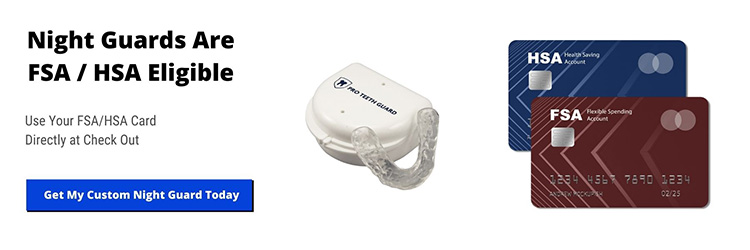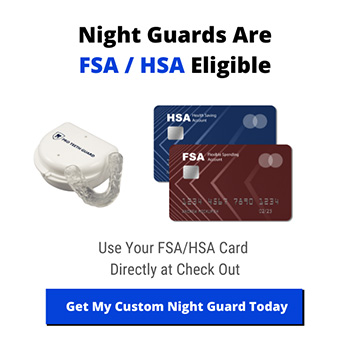Are Night Guards FSA / HSA Eligible?
2nd Jan 2021

Night guards aren’t cheap—some dental offices charge close to $1,000 for them. When you’re experiencing jaw pain from teeth clenching and grinding, finding a way to afford that dental appliance and get pain relief is crucial. While many insurance plans don’t cover the night guard cost, the IRS qualifies these dental appliances as eligible medical expenses on most flexible spending accounts (FSA) and health savings accounts (HSA). Qualifying individuals use these tax-free funds to pay for out-of-pocket health care costs. With Pro Teeth Guard, you can use your FSA or HSA card directly at checkout.
Dental Night Guard FSA And HSA Eligibility
FSAs and HSAs are savings accounts that are part of many health care packages. In many cases, they can help you pay for a night guard or other dental appliances. These accounts allow you to pay for certain medical and dental expenses for yourself, your spouse, and any dependents. You can also use these accounts to help cover deductibles.
Typically, TMJ, bruxism, and related issues are included under dental expenses. This means you can use your FSA or HSA to pay for dentures, occlusal guards, over-the-counter dental night guards, and custom night guards for teeth grinding. While most plans will allow you to use your account to cover the cost of night guards, check your account details to be sure. Your account will have a list of eligible expenses that you are typically able to access online.
Occlusal guards and mouthguards are not eligible with a dependent care flexible spending account (DCFSA) or a limited care flexible spending account (LCFSA).
Related Articles:
- Does Medicare and Medicaid Cover Night Guards?
- Night Guard Dental Insurance Code
- Guide to Choosing the Right Night Guard
How To Use Your FSA Or HSA
Once you’ve determined a dental mouth guard is an eligible expense under your FSA or HSA, using those funds to pay for it is pretty easy. In many cases, you’ll have a debit card that allows you to purchase eligible items. Pro Teeth Guard allows you to enter your FSA/HSA card information at checkout and easily purchase your mouthguard. Be sure to save any receipts or other expense documentation should your employer or insurance provider ask for them later. You might also need documentation from your dentist.

Some accounts don’t provide you with a debit card and instead require you to submit a claim to get reimbursed for your night guard. In this case, you’ll pay for the night guard out of pocket and then submit a claim with proof of the expense. You may be required to include a statement that shows the night guard was not covered by your insurance plan. Then, you’ll receive reimbursement out of your account for the night guard.
Because plans function differently and may require different documentation, talk to your employer if you’re not sure how your plan works. Always err on the side of over-documentation.
Related Articles:
What Is The Difference Between An FSA And An HSA?
Both accounts allow you to save your own money to later cover eligible medical and dental expenses. The most significant difference between an FSA and an HSA is who owns the account. With an HSA, you are the owner of the account and your contributions can roll over into the next year.
With an FSA, your employer owns the account and contributions typically do not roll over. This means you’ll want to be sure to use your balance before the year is over so you don’t lose it. If you’ve been hesitant to invest in a mouth guard and you have unused funds in your FSA, a night guard for bruxism is an excellent investment to relieve teeth grinding and jaw clenching pain.
Source: FSA vs. HSA

- Most Popular
- Hard Outside, Soft Inside
- 2MM Thick
- Moderate / Heavy

- Most Durable
- Hard Materials
- 1.5MM Thick
- Heavy / Severe

- For Day Time Use
- Thin, Barely Visible
- 1MM Thick
- Light / Moderate

- For Clenching
- Flexible & Soft
- 1.5MM Thick
- Light / Moderate


